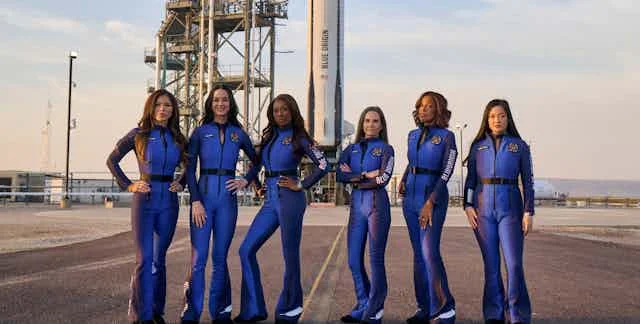
Who Gets to Be Called an “Astronaut”? Debate Rages On After All-Women Spaceflight
The recent all-women spaceflight aboard Jeff Bezos's Blue Origin vehicle has reignited the debate over who truly deserves the title of "astronaut." The discussion intensified after figures like Sean Duffy, former U.S. Transport Secretary, questioned the astronaut status conferred upon participants like singer Katy Perry and journalist Gayle King.
This debate remained relatively subdued until the advent of commercial suborbital flights in 2021. Back in the 1960s, U.S. Air Force pilots who soared above 50 miles (80km) in the rocket-powered X-15 jet were awarded astronaut status, setting a precedent that's now being challenged.
Sir Richard Branson's Virgin Galactic flight in 2021 reached 53 miles (85km), an altitude some experts recognize as the edge of outer space. Shortly after, Bezos's Blue Origin New Shepard vehicle ascended to approximately 68 miles (106km). Bezos's focus on the Kármán line, at 62.1 miles (100km), has become a focal point in defining the boundary of space.
A social media post from Blue Origin subtly suggested that those reaching the higher altitude with New Shepard were more deserving of the "space traveler" title than those traveling to lower altitudes on Virgin Galactic flights. This implicit comparison sparked controversy regarding the criteria for astronaut designation.
While Blue Origin emphasizes the Kármán line as an "internationally recognized boundary" of space, its universal acceptance is far from guaranteed. Proposed by Theodore von Kármán, this line aimed to differentiate between aeronautics and astronautics. Andrew Haley, an associate of von Kármán, later formalized the calculation, influencing space law.
The Kármán line lacks definitive scientific basis. Experts from various fields, such as geology, atmospheric science, and space physics, offer vastly different perspectives on the definition of space. For example, a magnetospheric physics expert might argue that space truly begins at the plasmapause, around 35,000 miles (57,000km).

The passengers' euphoric reactions after the Blue Origin flight, coupled with the company's use of the term "astronaut," triggered online criticism. This backlash prompted responses defending the participants, with observations that similar criticisms weren't directed at men on comparable flights. Katy Perry expressed feeling "battered and bruised" by the reactions.
Sean Duffy, US transport secretary, contended that the flight participants fell short of the Federal Aviation Administration (FAA) astronaut criteria. The FAA stipulates that an astronaut must be a crew member, contribute to spaceflight safety, and demonstrate activities crucial to public safety, with a minimum altitude requirement of 50 miles (80km).
Another argument arises: Would the perception shift if private space travelers conducted scientific research during their trips? This might elevate them beyond mere passengers, potentially qualifying them for the "crew" designation. However, current Blue Origin and Virgin Galactic flights offer limited opportunities for weightlessness research.
The legal implications of the "astronaut" designation are also noteworthy. Consider the case of William Shatner, who flew with Blue Origin in 2021. In the event of a health-related incident, who would bear the responsibility? Could an "astronaut" be held to a higher standard of accountability than a passenger?
The debate over who gets to be called an astronaut is more than just semantics. As the number of paying passengers venturing into space increases, the potential for adverse incidents grows, highlighting the need to define clear responsibilities and accountabilities within the burgeoning commercial space travel industry.
Ultimately, the question of whether merely traveling to space makes one an astronaut is open to personal interpretation. However, as space travel becomes more accessible, the broader implications of this designation warrant careful consideration.
What are your thoughts on the "astronaut" title? Leave your comments and share your perspectives below!